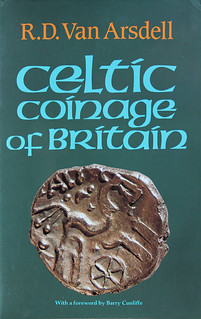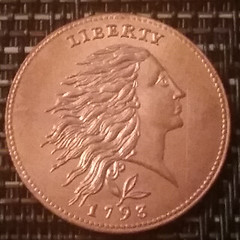
PREV ARTICLE
NEXT ARTICLE
FULL ISSUE
PREV FULL ISSUE
NOTES FROM E-SYLUM READERS: MARCH 18, 2018 More on Anamorphic Perspective The 3rd edition of Celtic Coinage of Britain has something like 2000 images you can use to play this game. You just need to tilt your phone or tablet. I launched the third edition of the book last December, it’s a completely revised edition of my 1989 book. Free on the internet for everyone.
Great idea! I spend so much time staring into my large fixed monitor that I hadn't thought of a handheld device. That's a great way to examine these designs. Here's the URL for the book:
http://www.vanarsdellcelticcoinageofbritain.com/
.
-Editor
To read the earlier E-Sylum articles, see:
Hetrich’s No. 10600 Civil War Token There is a “probable” answer to my earlier question regarding Hetrich’s no. 10600. Susan Trask, President of the Civil War Token Society, offers a plausible solution. Susan Trask writes: I rechecked the book and did find 1006 which are H&G dies 145/260. Converted to Fuld numbers this would be Patriotic Token 200/346. It has "New-York" on the obverse and "Constitution and the Union" on the reverse. These are relatively rare. The 200/346a (in copper) is a rarity 7, 11 to 20 known. The 200/346a over NY630W is rarity 8, 5 to 10 known. The 200/346e (white metal) is a rarity 9, 2 to 4 known. This could be the piece he was looking for as he was pretty specific TWICE that the number was 10600. He did mention that the request had been hand written, so maybe it was mis-stated. The published H&G numbers only went to 10506, a Store Card from White Water, WI.
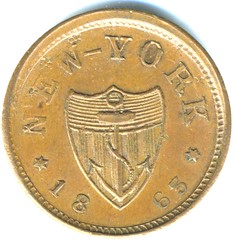
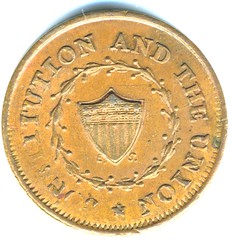
Fuld Patriotic Token 200/346 Images courtesy Q. David Bowers John Ostendorf writes: "Susan’s reply is as good a theory as I could propose. The token was obviously rare to warrant $2.50 in 1928. Temple was buying R-9 and R-10 tokens for less than a dollar in the 1940s. Could ‘10600’ been a temporary number that Hetrich assigned to the token when examining the token but away from his notes? The second paragraph of the letter implies there were about 100 unattributed tokens out there since the 1924 work. Bob Rightmire adds: When Guttag was selling this token for $2.50 in 1928, that’s more than $500.00 today.
Thanks, everyone!
-Editor
For information on the Civil War Token Society, see:
To read the earlier E-Sylum article, see:
Query: Guttag Brothers Store Card Information Sought Here's another Guttag Bros. question, this time about a Guttag store card. This mule, in lead, 10.40 grams, 28 mm, incorporates the obverse from their 1923 token with their 1926 token. My research has yielded little information about it other than King listing it as no. 1065 and Ginther citing that at least three are known. It’s not in the American Numismatic Society Guttag collection. Might any subscriber provide additional information? A census would be helpful too.
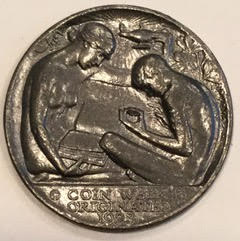
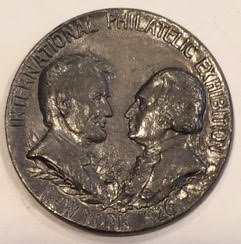
I've owned some Guttag tokens in the past, but I'm not familiar with this piece. Can anyone help?
-Editor
Query: "One Tongue" Token Information Sought I thought I'd send another mystery token for the readership to look at. It is some sort of white metal, but not lead. It has a reeded edge & is about 27mm. The obverse has a monogram which appears to be "V B & A". It is the reverse that is intriguing, "One Tongue". Could it be some sort of denomination? The "x" appears to be part of the striking, and not done afterward. It looks almost like a communion token, but I am not sure. Anyway, the last time I sent something in the readers took less than two weeks to come up with the answer, so I'd like to try again.
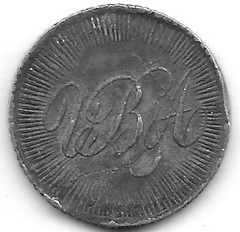
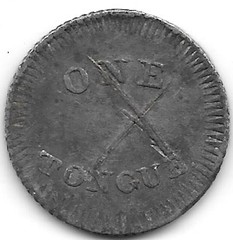
That's quite an odd piece. I've certainly never seen one, and don't know what to make of it. Can anyone help?
-Editor
To read the earlier E-Sylum article, see:
Query: Polish Medal Identification Sought I have an inquiry of my own since it seems like the E-Sylum readers either know everything or at least know where to find the information. Attached is a picture of a medal in my collection. It is 75mm and 9.5 ounces. I believe it is a Polish medal since there is a map of Poland on it. After hours of online research I can find nothing on it. Any help by readers would be appreciated.
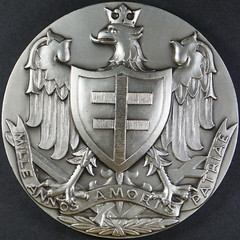
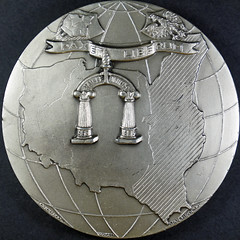
It's a nicely executed medal. Click on the images to see larger versions in our Flickr archive.
Below are some closeups of inscriptions and what
Google Translate produces for the English equivalent.
-Editor
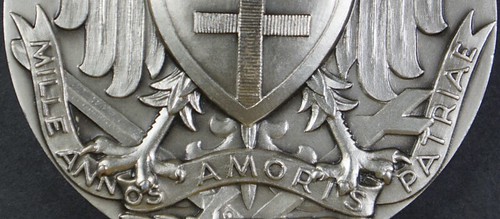
"MILLE ANNOS AMORIS PATRIAE" is "Love of country thousands of years"

"PAX ET LIBERUM" is "PEACE AND FREEDOM"
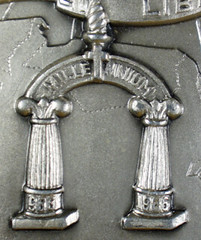
"MILLENNIUM" "966" "1966"
At the bases of the columns are the numbers 966 and 1966. Assuming these are years this medal celebrates a thousand year anniversary that took place in 1966.
I can't make out all the words on the bottom edge but on the right is "STAN. KUPOLSKI" -Editor Chris Bower adds: My wife had found that there was a 1966 celebration for 1000 years of Christianity but we are unsure if this is related to that.
So, if anyone can help, please let us know. Thanks in advance.
-Editor
Origins of the Word "Znachki" 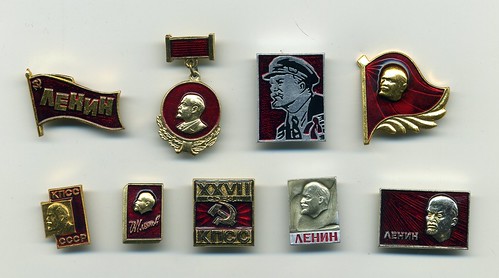
Joseph Alan Barnosky writes: In the article about uploads of the Alaska Znachki Bulletin to the Newman Numismatic Portal, Project Coordinator Len Augsburger refers to the word "Znachki" as ""far outside the lexicon of most readers". True enough, and that is, to me, with a year of Russian studies. On my mind, though, is a feeling of need to mention how much closer to home the word's root is. In the 2015 Standard Catalog of World Coins entry for Spitzbergen, the same word's root, "znak" is used for token. I think the plural is "znaki". It means "sign". It might not be very difficult to extend the usage too far, such as "plus sign" making sense, but "stop token" getting your source questioned, so, I wouldn't take that vocabulary too far afield, but tokens being of much interest to many numismatists, that the word of so many for tokens is so close at hand was, I thought, noteworthy.
Interesting. Thanks!
-Editor
To read the earlier E-Sylum articles, see:
On the David Litrenta Tokens The David Litrenta tokens are included in my list of personal tokens of numismatists. Litrenta appears in the index as being on page 213. That page includes a description of five Litrenta tokens. These were produced by the Patrick Mint.
Sorry I missed the listing - guess I didn't look hard enough. Thanks.
For another piece of Litrenta material, see my Numismatic Diary article elsewhere in this issue.
-Editor
To read the earlier E-Sylum article, see:
St. Patrick's Day Teaser
Dick Johnson submitted this St. Patrick's Day teaser. Thanks.
-Editor
It’s Irish. Looks like a medallic object. But what is it? Answer below.
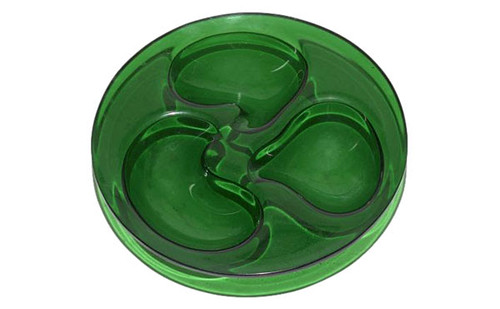
It’s a coverware serving dish. It does look like a medallic three-leaf clover, but the “petals” are cavities for serving food. It’s a $1,500 art creation by Evs Zeisel. 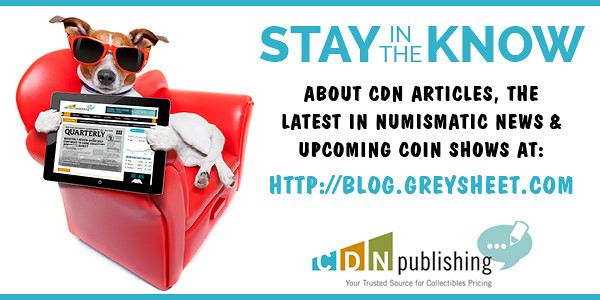
Wayne Homren, Editor The Numismatic Bibliomania Society is a non-profit organization promoting numismatic literature. See our web site at coinbooks.org. To submit items for publication in The E-Sylum, write to the Editor at this address: whomren@gmail.com To subscribe go to: https://my.binhost.com/lists/listinfo/esylum All Rights Reserved. NBS Home Page Contact the NBS webmaster 
|
